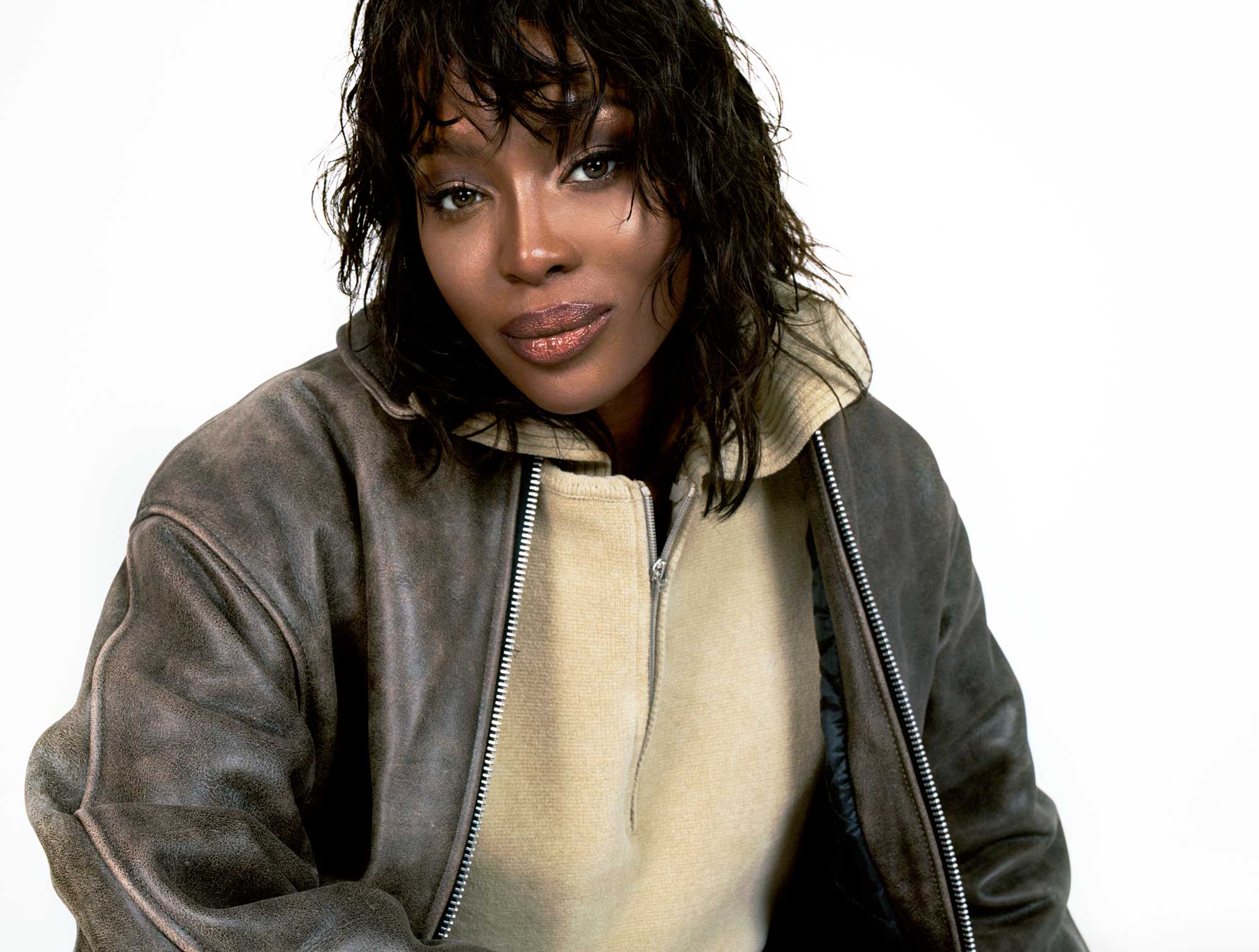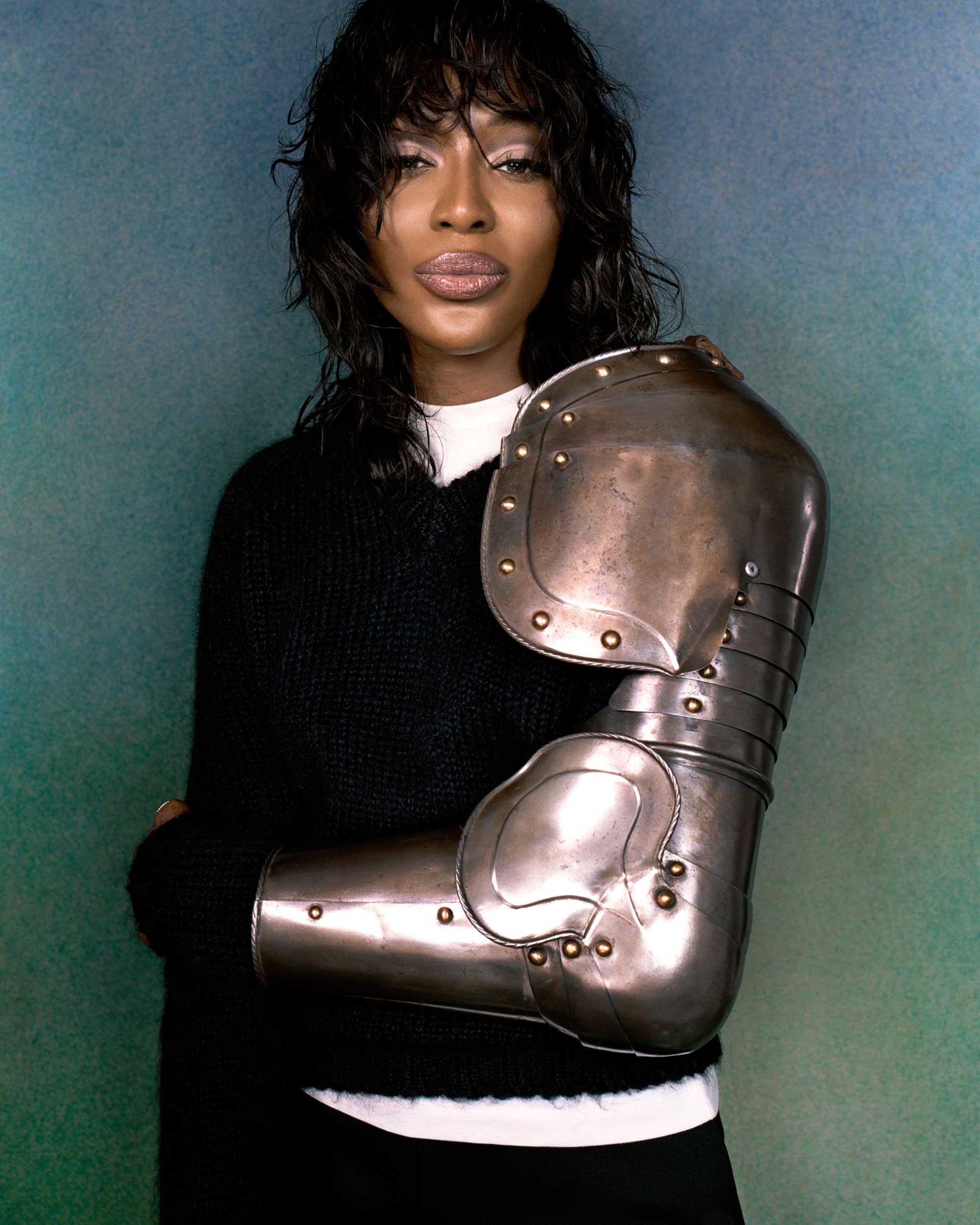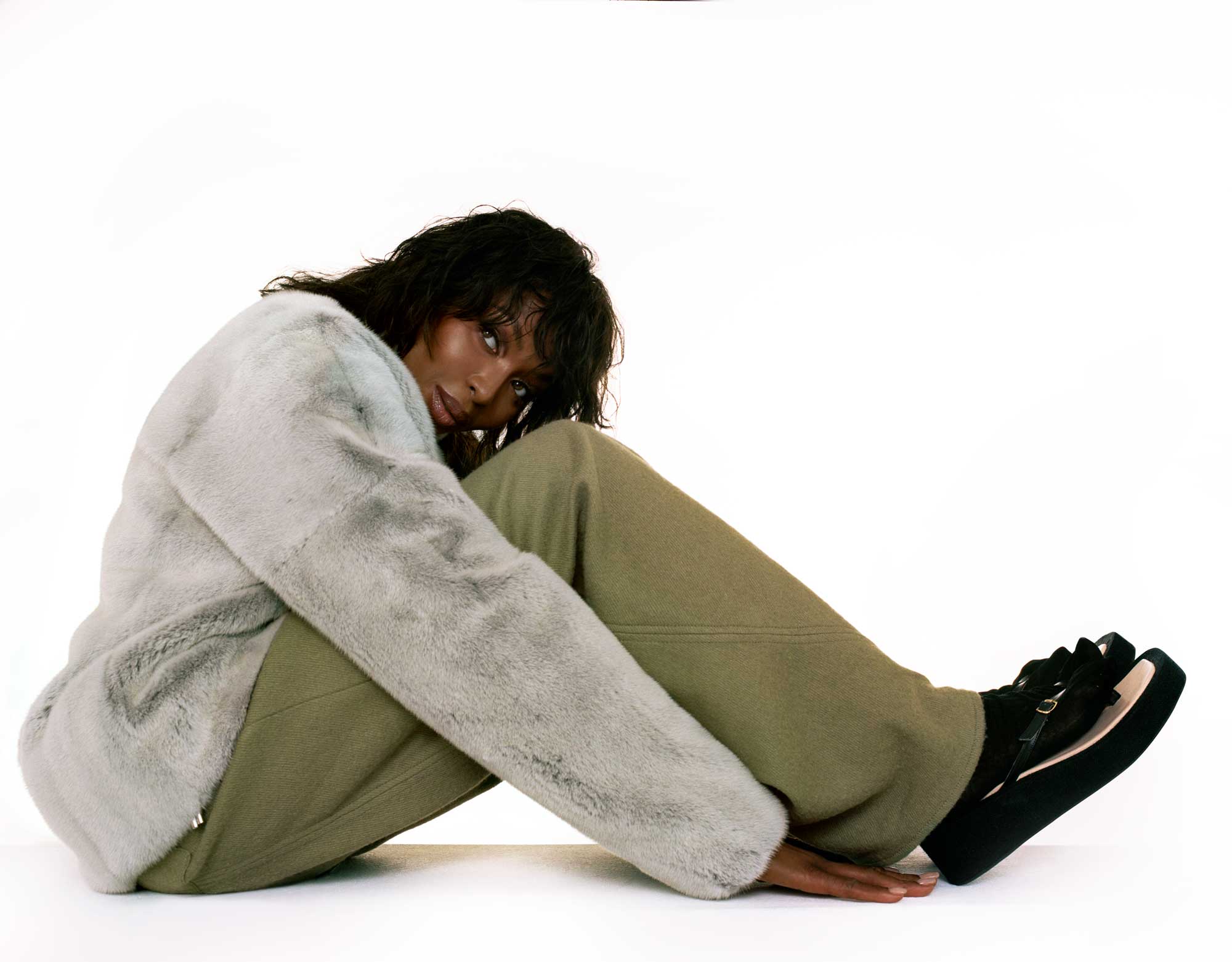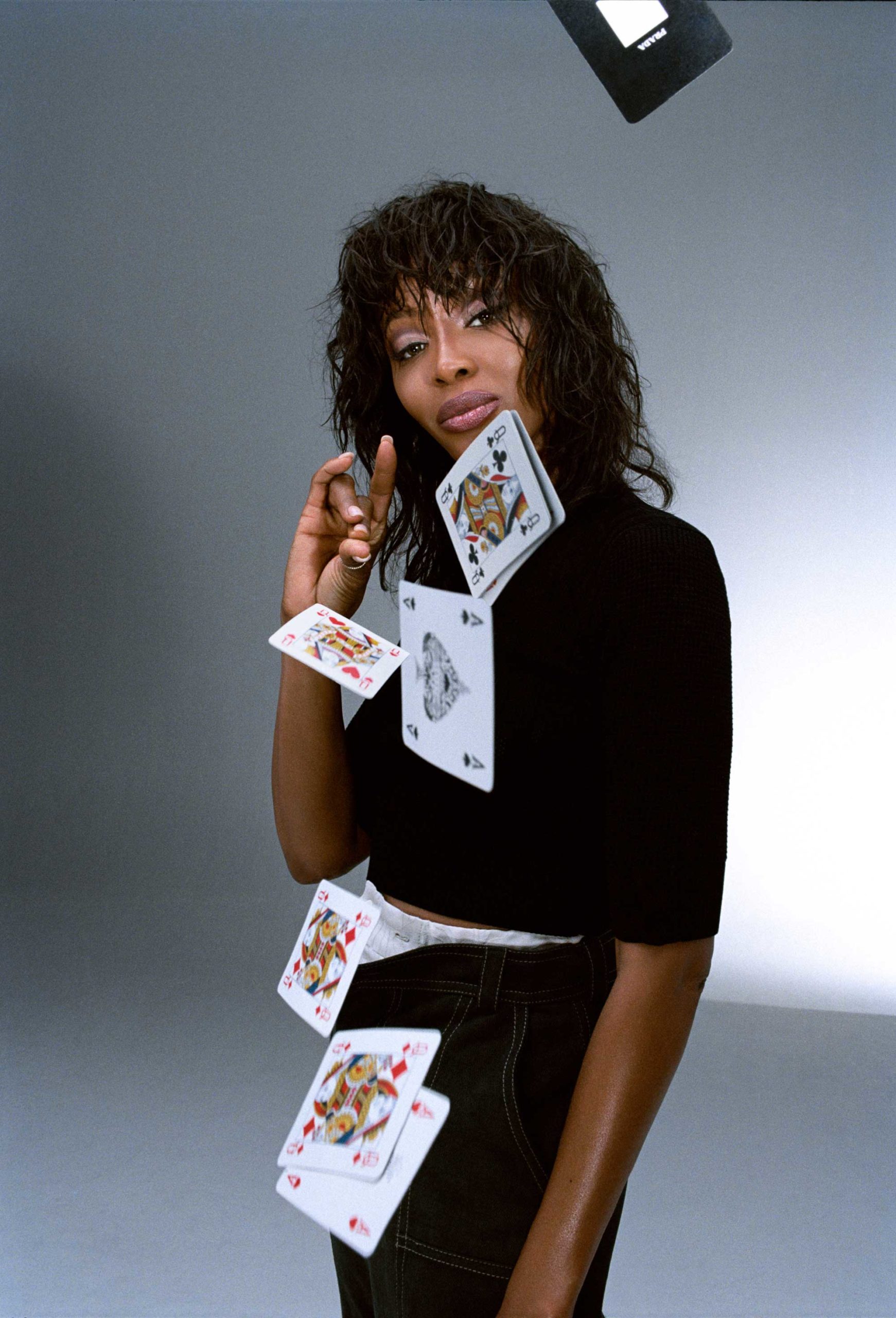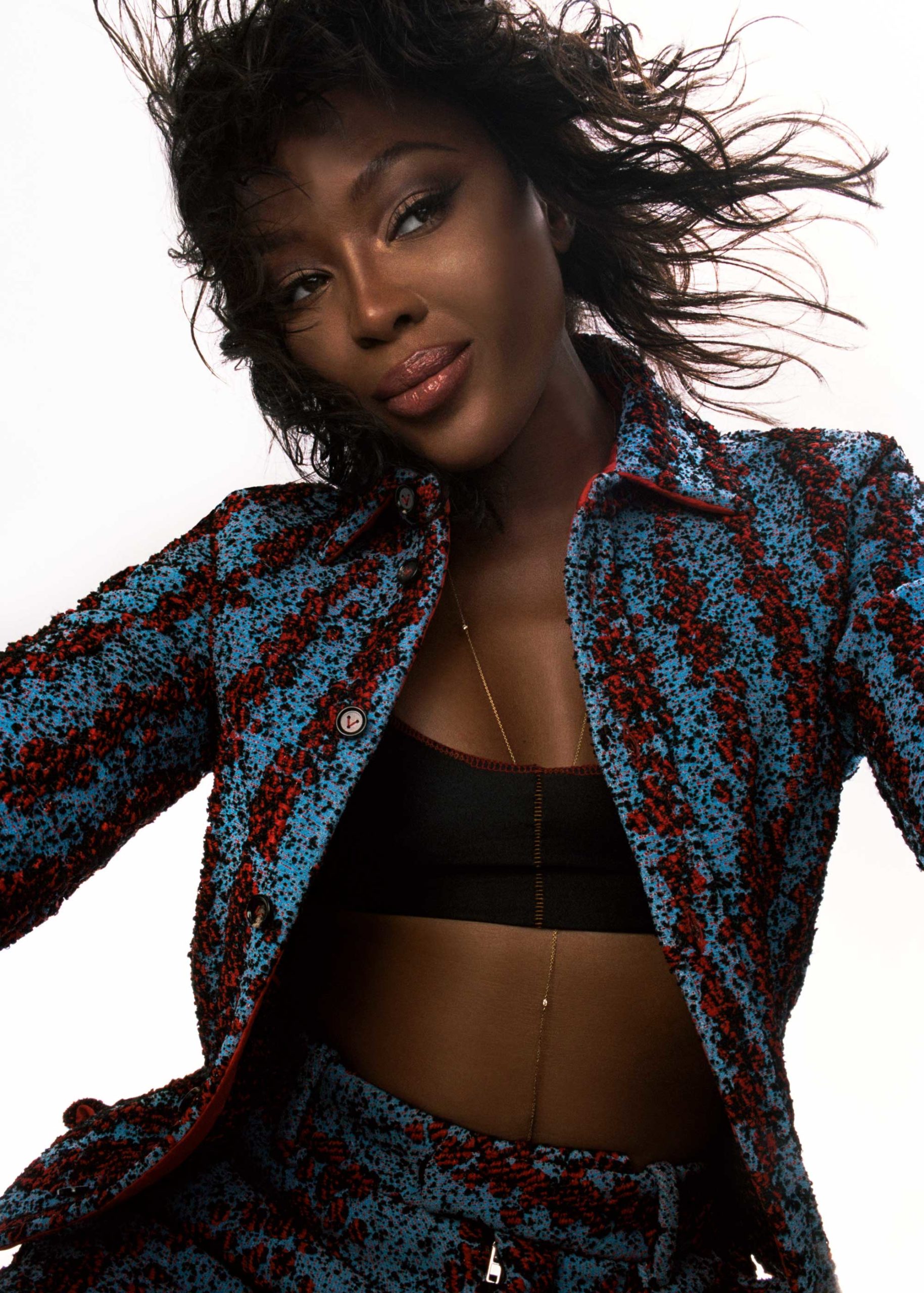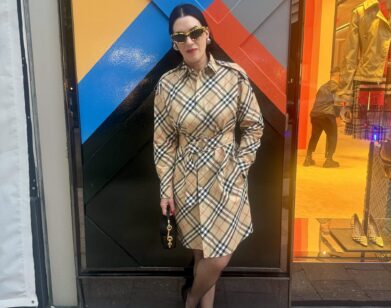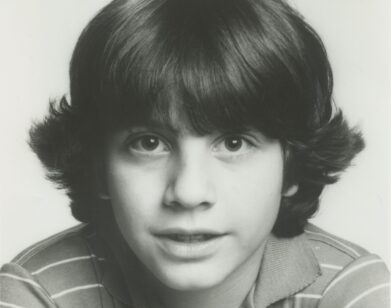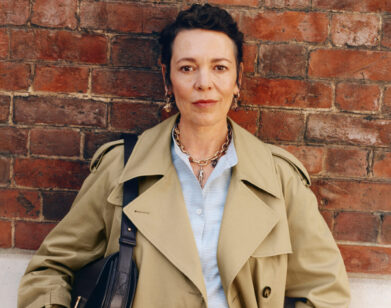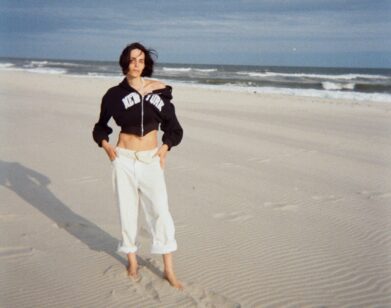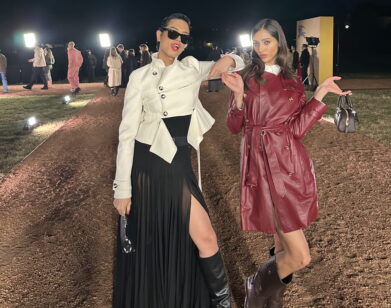cover
Naomi Campbell Talks to Marc Jacobs About 30 Years in the Spotlight
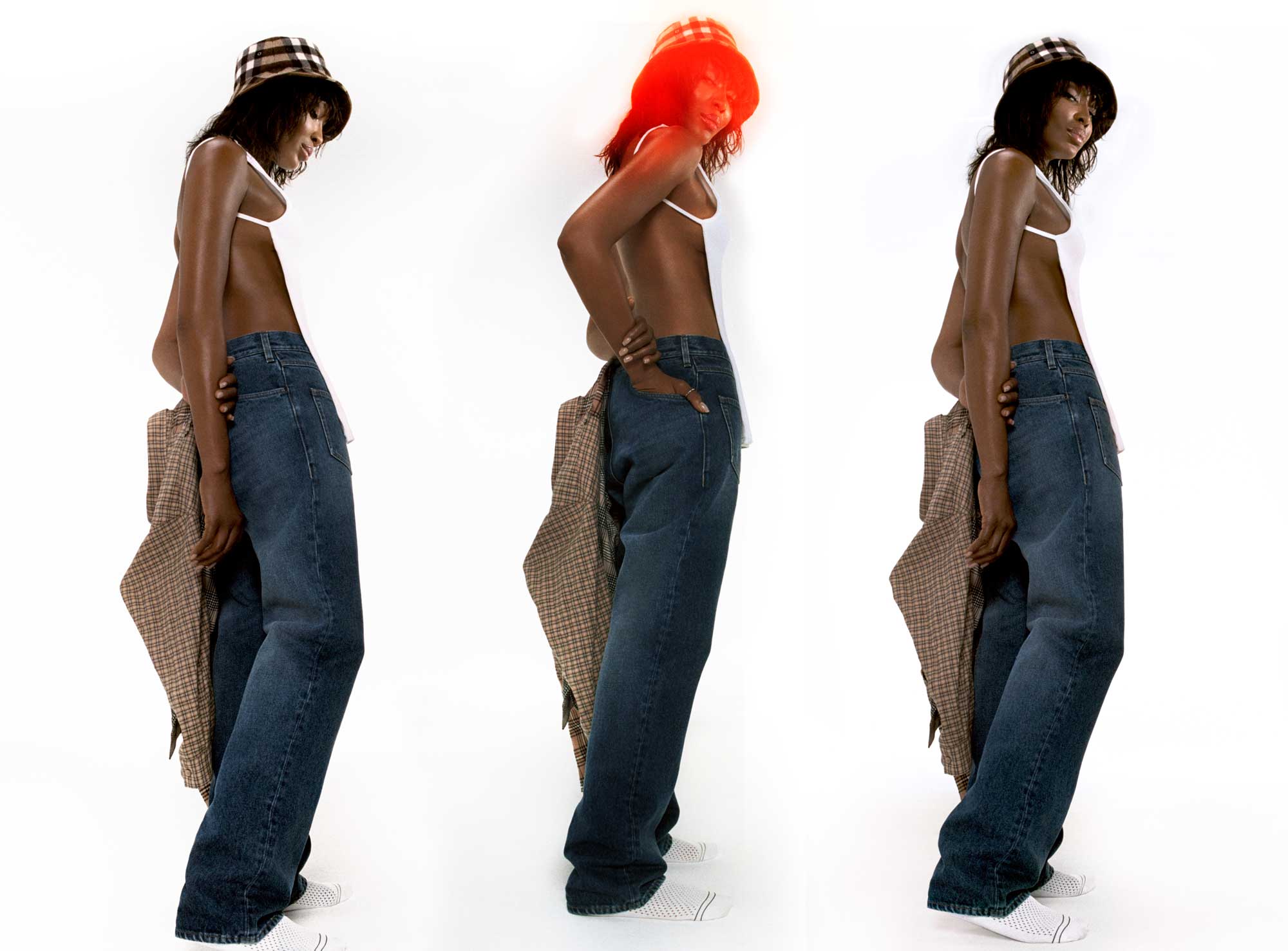
Naomi Campbell. Top by Lourdes. Shirt (worn on waist), Jeans, and Hat by Burberry. Ring (worn throughout) Naomi’s own. Socks by Falke.
Although she built a career by walking the walk, Naomi Campbell has never been shy about talking the talk. A model so super that she demanded a new term for her level of glamour, the girl who was discovered in her hometown of London at the age of 15 has gone on to a singular, enduring career in an industry where those can be scarce. And while her totality of covers, campaigns, and catwalks speaks for itself, it’s Campbell’s own voice that rings loudest. As the most visible Black model of her generation, Campbell has broken one barrier after another, such as becoming the first person of color to appear on the cover of French Vogue, in 1988, and on the cover of American Vogue’s September issue one year later.
Outside of the fashion world, Campbell has worked with everyone from George Michael to Madonna, but it was her relationship to the South African president Nelson Mandela, who called her his “honorary granddaughter,” that has left the most indelible mark. In the years since their first meeting in 1994, Campbell has become an ambassador for the continent, crusading against poverty while using her influence to spotlight its young designers. It was in Africa where the fashion designer Marc Jacobs recently found her, enjoying the weather and, yes, ready to talk.
———
MARC JACOBS: Naomi, I miss you so much. Where are you?
NAOMI CAMPBELL: I’ve been in Africa since December. It’s just easier here. There’s COVID, don’t get me wrong, but it’s easier to live outside than in.
JACOBS: Let me ask you, what is an average day like for Naomi Campbell?
CAMPBELL: It depends. I stay up quite late working with my team in L.A. I don’t get to bed before 3 a.m., so I don’t get up until like 10 or 11. Then I work out, and then my day starts. People in New York start early, so by 2 or 3, I’m getting messages. I try to be outside in the open air as much as I can these days, and I go to bed tired every day.
JACOBS: Do you get dressed up and made up before you start your day?
CAMPBELL: No, no, no. If I’m working out, I’m in workout clothes. After that, I’m in easy clothes. I wear a lot of caftans, especially when I’m here. High heels are not happening unless I’m working on set. When I have certain things I have to do, like my virtuals, I do make myself up. Pat McGrath’s makeup is like Playskool painting. You just make it up as you go along. I’ve gotten better at learning how to do my makeup, especially my eyes.
JACOBS: When was the last time you did the dishes?
CAMPBELL: I don’t know.
JACOBS: Do you cook for yourself?
CAMPBELL: I was cooking at the beginning of lockdown in New York. I cooked, I cleaned, I washed my own clothes. There’s nothing I cannot do for myself. That’s the way I was raised by my grandmother and mother. That’s the way Jamaican heritage is. There are a lot of things I have to thank coronavirus for. It brought back a lot of things that were instilled in me as a child.
JACOBS: Do you ever watch TV?
CAMPBELL: I do. I’ve kind of weaned myself off the news. I know a lot of people had to. I’m definitely into watching all these wonderful films that are coming out. All the streaming platforms have been incredible. I still enjoy awards season even if it’s going to be virtual. I think creativity has been incredible during lockdown.
JACOBS: What’s your favorite series?
CAMPBELL: I’m loyal to my Andy Cohen. I’m still watching Real Housewives. Mind you, I did send Andy a message in the summer saying, “Atlanta and Beverly Hills are finished. What do I do now?” He was like, “Watch The Real Housewives of Potomac.” And I have to say, I enjoyed every bit of it.
JACOBS: Back to the cooking thing for a second. What is the best meal you can make when you’re trying to make a good impression on someone? We had a great moment over your English chicken, but what is the absolute best?
CAMPBELL: I still do that. I still do gravy Cornish hens. I love to cook salmon in the pocket, which is salmon with green onions and spice, then cooked in foil. I’m learning how to do Nigerian food, and jollof rice, which is Ghanaian. Each place I go, I’m learning how to cook something new.
JACOBS: Do you ever try to impress people?
CAMPBELL: I try to be at my best. Whether you call it trying to impress, I just try to be my authentic self. People are going to have their opinion of you, so you just have to be yourself.
JACOBS: What is the best thing about being you?
CAMPBELL: I’m blessed to have had loyal, solid, and long relationships, like I have with you. When we’re younger, we don’t know what’s going to happen, where we’re going to go, or how we’re going to end up. It’s so nice to watch each other grow and to be in each other’s lives supporting each other from afar or close by, but just being there.
JACOBS: Has there ever been a time when you wished you weren’t Naomi Campbell?
CAMPBELL: I don’t think that way. It would be ungrateful of me, and people would be like, “What’s she got to complain about?” Maybe if I want to do something like go to Luna Park or Magic Mountain, and I want to just get through it all, but no, I own who I am.
JACOBS: This is a funny question, and I’m not sure there’s an easy answer. What, for you, will go down as your most iconic fashion or cultural moment?
CAMPBELL: That’s such a difficult question, innit, Marc? There have been so many eras, even just with you. I wouldn’t know where to go. I enjoy dressing up. I appreciate the workmanship that goes into clothes and the creativity that everyone puts into it. I want to know, “Was it handmade? How many hours did it take?” But what I really want is to help make the industry inclusive of all the countries that have not been included in our business. That’s what I’m really focused on in all creative forms, that they get the same opportunities and platforms as the rest of the world, because they are a part of the world.
JACOBS: Here’s an easier one. How did you learn to do your walk? Was it natural, or did you have help?
CAMPBELL: My dance background might have helped, but it wasn’t something I planned. I’ve always said it’s who I was wearing and what I was wearing that had a great part to play in how I walk. I have definitely walked differently on the same day, because you feel a different type of vibe when you put on someone’s clothes. When someone says to me, “Do your walk for me, Naomi,” in the living room or on the street or something, I cannot. I need the whole vibe. Plus, when I walk in flat shoes, I walk the complete opposite of how I walk on the catwalk. When I’m in sneakers, I walk like a tomboy. Sometimes my toes turn in, so who knows? It’s like a whole other person.
JACOBS: Charly [Defrancesco, Jacobs’s husband] had never seen the old Mugler shows, and he put one on and you were in it and he was amazed. I was like, “Yeah, look at Naomi back then. It’s crazy.”
CAMPBELL: Oh, gosh, those shows were hilarious.
JACOBS: It was the one with Diana Ross. His jaw just dropped.
CAMPBELL: In those days, they were shows. We didn’t know who was going to be there, everyone from Patty Hearst to Jeff Stryker to Traci—what was her name again?
JACOBS: Traci Lords.
CAMPBELL: The porn star. We didn’t know! We were all mixed up.
JACOBS: You have gone so far beyond being a model. Is there anything that you’ve turned down that you now regret?
CAMPBELL: No. I still feel like it was right for me to stand up for my rights as a Black woman and not take way less financially than I used to be offered compared to my white counterparts doing the same job. As much as I wanted to have those contracts like my white counterparts back in the day—in perfume, in makeup, in whatever—it was worth keeping my integrity and saying, “No, thank you.” It was worth my agent at the time not wanting to work with me because I didn’t want to accept something that was degrading to myself and to my culture.
JACOBS: Good. Is there anything that you said yes to that you regret?
CAMPBELL: There are plenty of things we say yes to when we’re younger that we are not really clear about. One of the things that’s really come to surface right now for me is that we don’t have any control over our image as models, and that’s really sad. When I was doing my book with Taschen, there were a few photographers whose names I won’t say, but who we do know and who I’ve worked for over the years for, like, one dollar, who came back saying they wanted all this money to be in the book. And I was like, “Excuse me, you’ve forgotten.” There’s going to have to be a change in our industry where they protect us as models better than they have, because we cannot just sign our image away and not have any ownership over it. That’s why doing this docuseries [The Supermodels] with Linda [Evangelista], Christy [Turlington], and Cindy [Crawford] was so important, because it’s our legacy that we’re talking about. I’m bringing this up because I feel like it’s going to come up sooner than later, so it might as well come up now. When we signed papers giving our lives away, no one ever explained anything back then, and when you’re younger, you want so much to be in a magazine, or to do the shoot, so you just sign these things, but no one ever really, really explained what the small print was about.
JACOBS: You’re absolutely right. Even as a fashion designer, we supply clothes for editorials, and yet we have no rights to use that image. It’s only the photographer who has the rights, but all of this is teamwork, and everybody who’s a part of that team deserves some access to use or hold onto or be rewarded for the work they’ve done.
CAMPBELL: I’m basically speaking about this for the first time. I’m not trying to make any headlines, but it’s something that’s been on my mind heavily, and it needs to be unraveled and really gone through, so that it benefits everyone. It’s not going to change overnight, but it needs to be changed.
JACOBS: What needs to happen is a conversation, and by saying this, you’re saying, “I want this to be a part of the conversation.”
CAMPBELL: Yeah. Diversity is a conversation, and now this needs to be a conversation, because young girls like Emily Ratajkowski are bringing it up. It’s already out there. The can of worms is open.
JACOBS: When you have a conversation, what is your favorite question to ask people?
CAMPBELL: I just sit and rap. I’m definitely not an interviewer, but I’m intrigued by everyone that I talk to.
JACOBS: Who is the biggest diva you’ve met?
CAMPBELL: I think divas are a good thing. I don’t look at diva-ness as a negative.
JACOBS: I don’t, either.
CAMPBELL: I had a conversation with Mariah, actually, and we were discussing that. Divas are allowed to be divas because they’re bigger than this world in terms of their talent. I embrace divas.
JACOBS: The biggest diva I ever met was Aretha. I was awestruck by her.
CAMPBELL: I’ve met some incredible ladies: Whitney, Aretha, Tina. I call them queens.
JACOBS: That’s a good word.
CAMPBELL: Our Black queens.
JACOBS: What or whom is your greatest love?
CAMPBELL: As a person in a relationship?
JACOBS: You can answer it however you want.
CAMPBELL: I can’t answer that question at this moment. Ask me in a few months.
JACOBS: What’s the best gift you’ve ever been given?
CAMPBELL: It was an absolute gift to have President Nelson Mandela in my life for 20 years. It wasn’t like I just saw him once a month or once a year. It was a consistent relationship of grandfather and granddaughter. I always used to say, “Why me? I’m the bad girl. I’m the underdog.”
JACOBS: I’ll never forget that Christmas card you sent me with you and Nelson Mandela on it. I still have it. What is the best part about getting older?
CAMPBELL: Knowledge. Understanding we’re never too old to be wrong. We’re never too old to learn. We’re works in progress and trying to better ourselves. We come here for the time that we come, and we want to do the best we can while we’re here, because one thing we do know is we’ll be leaving.
JACOBS: What is the worst part of getting older?
CAMPBELL: Physically, you need to make sure you’re stretching, you’re toning. You can’t eat all the things you used to eat. Energy is so important. I’m 50, but I don’t act like I’m 50.
JACOBS: Is there an aspect of fame that you haven’t gotten used to?
CAMPBELL: I don’t like that word. I’ve never tried to be that.
JACOBS: Let’s think about it differently. You’re super well-known, and we all lose our anonymity when we become known. Is there an aspect to being known that makes you uncomfortable?
CAMPBELL: There’s always going to be something that’s out of your comfort zone. People are always going to have misconstrued ideas of what they think your life is like and what you’re about and what you do and what you should be doing.
JACOBS: Do you hate that, or are you comfortable with it?
CAMPBELL: There’s nothing I can do about it except tell people who I am and what I’m about.
JACOBS: How many times have you walked onto the runway wearing something you don’t like?
CAMPBELL: Oh my god, so many! What I would do is walk so fast that if you blinked, you’d miss me. No extra turns, no stopping and lingering. There were a couple of times back in the day in Europe when I had to say, “No, I’m not going to wear this outfit,” because it was very stereotypical, and I wasn’t doing it. I’m not going to go on the runway looking like a Rastafarian.
JACOBS: What is your greatest achievement?
CAMPBELL: I don’t know, because I’m not done.
JACOBS: What is your biggest mistake?
CAMPBELL: So many. I should have spoken out more, but back then if you spoke out, people wouldn’t work with you.
JACOBS: You mean speaking out in terms of your views on people of color?
CAMPBELL: Yeah.
JACOBS: Thank god for Bethann [Hardison], right?
CAMPBELL: Bethann was my rock. Being 17 or 18, I was calling her and telling her everything. She gave me her ear, but she also gave me the courage to speak out.
JACOBS: If you put yourself in the shoes of someone who doesn’t know you, can you finish this sentence as them? “Naomi Campbell is…”
CAMPBELL: Real.
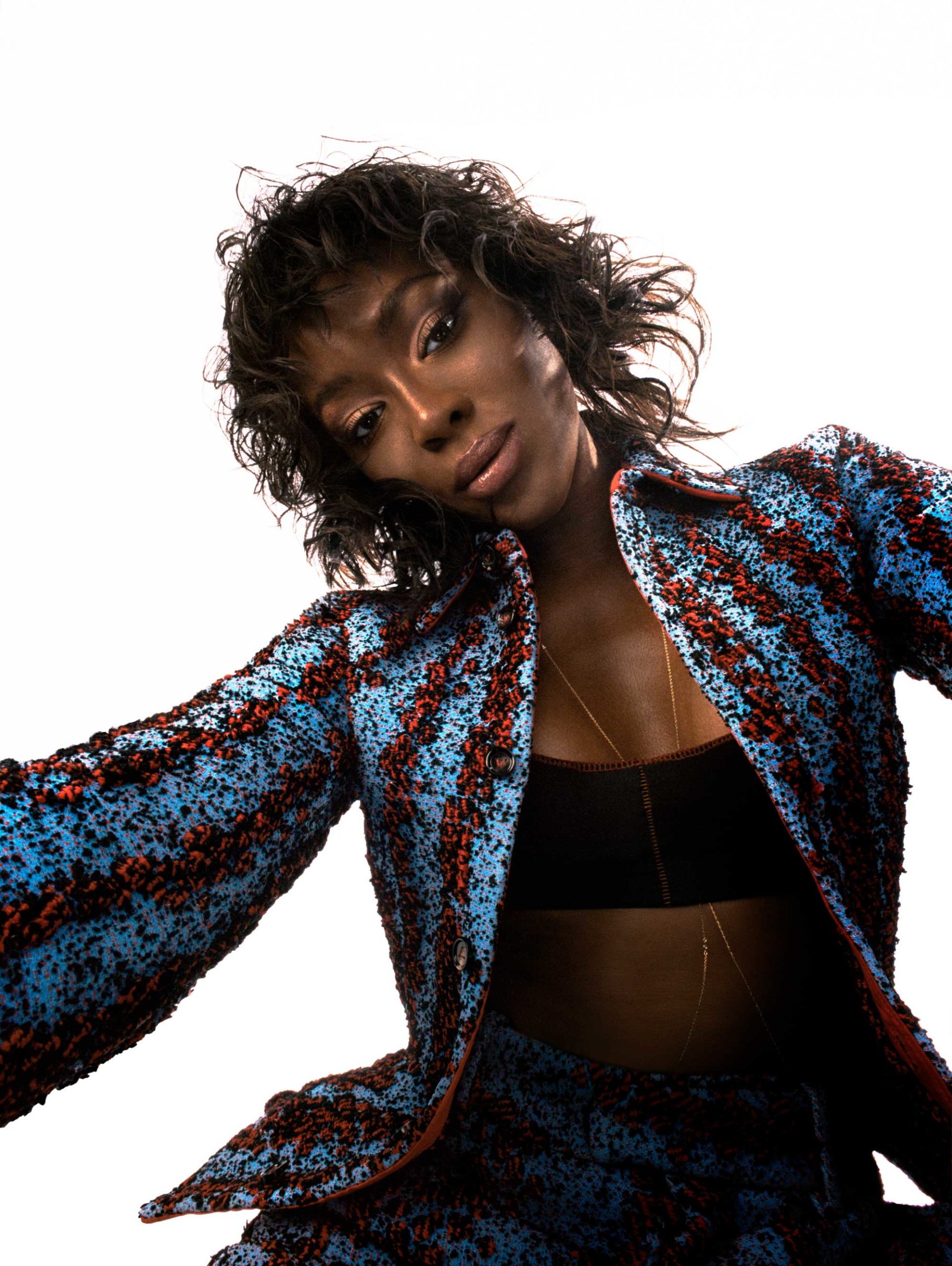
Jacket and Pants by Bottega Veneta. Top by XULY.Bët. Body Chain Naomi’s Own.
———
Hair: Laurent Philippon at Bryant Artists
Makeup: Daniel Sallstrom using Pat McGrath Labs at MA World Group
Casting: Anita Bitton at Establishment Casting
Executive Production: Abi Bickley
Line Production: Jocelyn Rummler
Lighting Direction: Benjamin Tietge
Tailor: Anh Duong
Photography Assistants: Jakub Fulín, Lucas Mathon, and Erwann Petersen
Fashion Assistants: Isabelle Dubourdieu and Kevin Lanoy
Hair Assistant: Michael Thanh Bui
Production Assistant: Remi Amuah
Retouching: Andrea Concina

